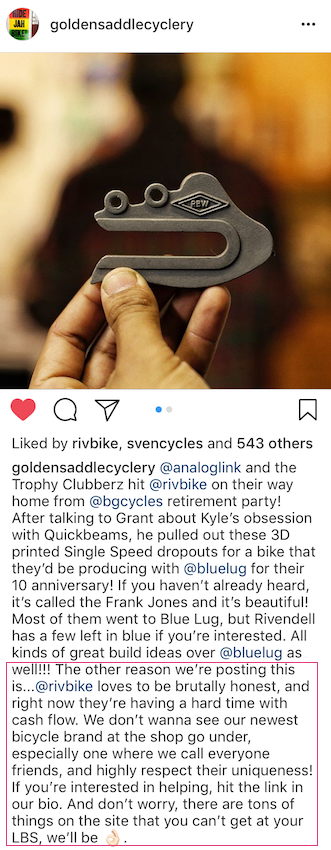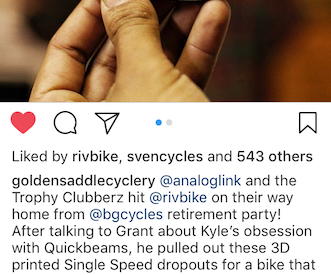How, and why, the cycling community saved one of its own
At the end of February, a bike shop based in Los Angeles put out an unusual post on Instagram. Golden Saddle Cyclery?s updates tend to be fun and flippant ? jokes about their mechanic Jimmy or homages to local pizza places ? but this one struck a more serious tone. It was a photo of a bike part produced by Rivendell Bicycle Works, an iconic West Coast bicycle design and manufacturing company. The caption started off describing the intricacies of the 3D-printed single speed dropouts, but then took an unexpected turn.

?The other reason we?re posting this is?Rivendell Bikes loves to be brutally honest and right now they?re having a hard time with cash flow. We don?t wanna see our newest bicycle brand at the shop go under, especially one where we call everyone friends, and highly respect their uniqueness! If you?re interested in helping, hit the link in our bio. And don?t worry, there are tons of things on the site that you can?t get at your LBS (Local Bike Shop), we?ll be fine.?
This post was just one of many which appeared across cycling forums and social media accounts over the course of a couple of days. Suddenly the whole cycling community seemed to be talking about the fact that one of its most-admired bicycle brands was about to go bust. Rivendell Bicycle Works was going to miss payroll and had just days to raise the cash it needed to survive, otherwise the twenty-year-old business was in danger of becoming just another name in the second-hand bicycle market.
 A Rivendell bicycle enjoying the ferry ride to the San Juan islands
A Rivendell bicycle enjoying the ferry ride to the San Juan islands
Rivendell Bicycle Works was established by Grant Petersen in 1994 to create and sell beautiful lugged steel bicycle frames and hand-crafted accessories. Bicycles made by Rivendell Bicycles turn heads; beautiful lines, stunning colours, a pleasing vintage feel and artisan touches (such as hemp twine to hold down bar tape) which you won?t see on any other bicycle.
And the bikes aren?t just pretty; they are built to last, ?designed to be used hard and handed down for generations of riders.? This commitment to enduring value is unusual in an industry which is too often dominated by short-lived trends as more people get into cycling, and bicycle brands scramble to sell them them the next bit of revolutionary technology which will take them closer to the professionals.
The refusal to play that game is down to Petersen, well-known for his controversial views on the industry, including the belief that professional road-racing has destroyed cycling for the majority by making it synonymous with suffering, when it should be about enjoyment.
Petersen?s entire ?velosophy? is summed up at the end of the introduction to his book Just Ride:
Jettison the influences of racing that make your bike less than fantastic. Don?t suffer in the name of speed, imaginary glory, or Internet admiration; don?t ride bikes that don?t make sense for you; don?t wear ridiculous outfits just to ride your bike; don?t think of your bike as a get-in-shape tool and riding as something you have to suffer to benefit from. Your bike is a useful convenience, and a fun, somewhat expensive, toy, and riding is best for you when it?s fun.
Rivendell Bicycle Works ? both its design and its values ? appeals to a certain type of cyclist. Its products are bucket-list bicycles for all those riders with an interest in style, craftsmanship, longevity and a yearning for the simple freedom which comes from taking to the road on two wheels and seeing where they take you.
Rivendell?s sudden cash flow problems were all the more surprising because of the brand?s values. The ?About? section of the company website boasts that ?behind the fancy paint you?ll find a commitment to quality, supply-chain responsibility, and a healthy work environment for our staff.?
What went wrong is not immediately clear but it seems likely that Rivendell had too much cash tied up in its stock as it tried to service an ever-growing list of customer orders. What is obvious is that financial missteps created an environment which was not healthy for staff, who were faced with losing their jobs in the space of just a few days.
But where perhaps Grant Petersen had lost sight of his long-term goals and ended up in a short term funding crunch, his approach to the crisis was characteristically bold. Rather than hiding the problem, he took the unusual step of being transparent about the issues his business was facing and asking for emergency funding from anyone who would listen, in the form of a $10 ?Hail Mary? credit voucher purchased online and redeemable against any future purchase.
What happened next is astounding in and of itself, but perhaps not such a surprise to those familiar with the cycling world or with Rivendell Bicycle Works. The Hail Mary message spread fast and soon the money came pouring in. In just 4 days, Rivendell raised $215,000. It was enough, according to Petersen, in a moving letter of thanks, ?to pays bills, buy inventory, pay credit card debts, pay decent chunks towards bikes already ordered and too late to take back and pay off most of our line of credit.?
Lots of companies run out of funding; there is a reason that ?cash is king? is the number one rule in business. So how did Rivendell manage to turn its situation around so dramatically?
Firstly, they asked for help ? in a very public way. In that kind of situation, most businesses hide away but Petersen?s natural impulse was to be open. It worked because it was authentic, an honest admission of failure and a straightforward request for a second chance.
Secondly, it?s striking that Rivendell?s call for support was amplified by other bicycle brands as well as fans and customers. Modern businesses are acutely aware of the need to build and nurture a community around their brand; a cynic might say that this is usually a means to grow sales. But Rivendell didn?t just engage potential customers. It established relationships with all sorts of players within the wider cycling ecosystem who then felt compelled to help one of their own.
Thirdly, and most importantly, Rivendell Bicycle Works stood for something unusual which people were willing to fight for. The motivation of those getting involved was primarily a respect for Rivendell?s unconventional attitude and approach ? their ?uniqueness? as Golden Saddle Cyclery put it. Daily Bread Cycles told their followers to ?buy a ticket, share the info and enjoy to a company that was always a sting in the flesh of the mainstream.? Another user posted that ?Rivendell need some love, so buy something from them if you can?Thank you @rivbike for all you have done over the years. My dearest wish is that you continue to soldier on.?
Petersen went on to assure his benefactors that Rivendell would never find itself in this position again. ?We?re not going to blow it and waste your help. From now on we?ll order and stock more conservatively, so we?re bound to sell out faster and might be out of stock when you finally want it.?
But even amongst all the contrition, it seems that he couldn?t resist a little poke at the mainstream cycling world:
?We?ll be better at the business, but we won?t change what?s working already, and I promise we won?t get more mellow about bicycles or gear. We?re not joining the World Team.?
As it heads into its next chapter, followers and fans of Rivendell Bicycles Works wouldn?t expect anything less.


